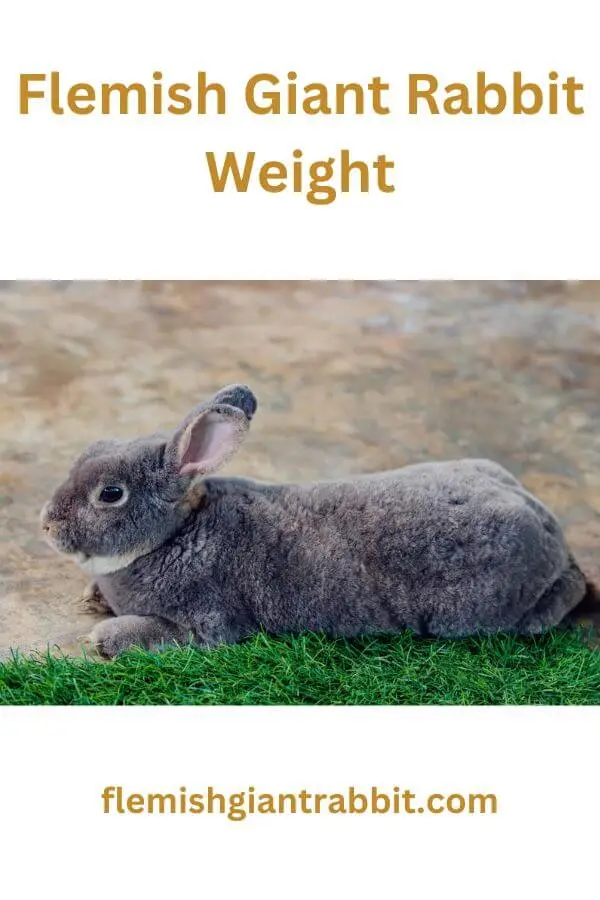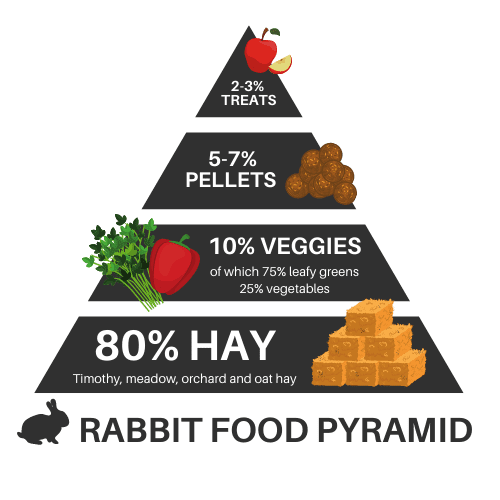
As a veterinarian with several years of experience, I’ve seen different breeds of animals, both domesticated and wild.
The Flemish Giant Rabbit is one animal that has always captured my interest. I’ve shown interest in this breed of rabbit ever since I first learned about it many years ago.
In this article, you will find out all you need to know about the Flemish Giant rabbit weight.
Flemish Giant Rabbit Weight
The huge weight of the Giant Flemish Rabbit differs from other breeds.
These rabbits weigh up to 22 pounds, which is around 10 times more than a typical rabbit’s weight.
Their males often weigh larger than females.
Its great size grabs the attention of both animal lovers and pet owners.
Your Flemish Giant Rabbit’s entire health and well-being depend on how much they weigh.
The weight of a rabbit can tell you important details about its health status. It will also let you know the kind of feed you should give it.
Weigh your rabbits frequently to ensure they are not overweight or underweight.
HOW TO MEASURE THE WEIGHT OF A FLEMISH GIANT RABBIT?
It is preferable to use a scale made for animals to weigh your Flemish Giant Rabbit. These scales can be purchased online, at pet stores, and at veterinarian offices.
Make sure you get a scale that can handle the size and weight of your rabbit when making your selection.
Make sure the scale is set to zero before putting your rabbit on it. This will guarantee that the weight of your rabbit is accurately measured.
Keep your rabbit calm and cool when you weigh them because any disturbance might affect the results.
Put your rabbit on the scale gently, then wait for the reading to stabilize. Note the weight measurement and keep a record of it for future use.
Use this procedure again to track your rabbit’s weight gain over time.
A crucial aspect of your rabbit’s general health care is keeping track of its weight.
Large Weight changes may be a sign of health problems or other issues that need to be addressed.
If your rabbits start losing weight, it shows they are not getting enough food or they have a serious health issue.
But, if your rabbits gain much more weight than expected. it might be a sign that they eat too much or their diet needs to be changed.
Finally, an essential part of your Flemish Giant Rabbits’ general care is to weigh them.
By observing their weights, you can detect any changes in their health status and correct their food if it’s required.
Make sure you weigh your rabbits frequently to make them stay healthy.
Factors That Affect A Flemish Giant Rabbit Weight?
Like humans, animals can have a wide range of weights based on their age, diet, exercise, and general health.

Let’s talk about them below.
- Age: By the time they are six months old, Flemish Giants usually meet their full size.
A Flemish Giant Rabbit can live for five to ten years. Nonetheless, they can live up to 14 years if they are being adequately cared for.
- Diet: A balanced diet is necessary for keeping your Giant Flemish rabbit at a healthy weight.
Serve hay daily to your Flemish giant rabbits. It should be a major part of their daily food. Fresh vegetables including fresh carrots and cucumbers should be fed to them too.
In moderation, pellets should only make up a small part of your rabbit’s diet. Choose a premium pellet that is specially designed for rabbits.
- Exercise: Flemish Giant Rabbit is a breed that can get big and weigh up to 22 pounds (10 kg) or more. Make sure they keep a healthy weight by exercising.
They are natural runners, they need space to move around.
Provide spacious housing for them. A matured Flemish giant rabbit needs more space to exercise.
How to Know That Your Flemish Giant Rabbit Weight is Healthy
To know if your Giant Flemish Rabbit’s weight is healthy, you can follow these steps:
- Know the weight range for a Giant Flemish Rabbit: A fully grown male rabbit weighs 13-15 pounds while females weigh 11-14 pounds. If your Flemish giant weight is way higher than this weight range, then it’s overweight. If the weight is very low like 7 pounds and below, your rabbit is lean and probably sick.
- Weigh your rabbit regularly: You can use a digital scale to weigh your rabbit and keep track of its weight. It is recommended to weigh your rabbit at least once a month. Weighing your Flemish giant rabbit regularly will help track when they are becoming obese or lean. Making you more conscious of their daily diet and the practices that promote a healthy weight.
- Check for physical signs: A healthy Giant Flemish Rabbit should have a round, firm body with a shiny coat. You should also be able to feel its backbone and ribs without pressing too hard. If you feel the pointy bones at a touch, then your Flemish giant rabbit is underweight. The bones are covered with layers of fat and flesh. So, you should not feel it by just pressing shallowly.
- Observe its behavior: A healthy rabbit should be very active and vigilant, It will have a good appetite. It will be curious about its environment. If your Flemish giant rabbit refuses to move around and prefers to stick to a corner. Then, something is wrong! Your furry friends need medical attention.
- Visit a veterinarian: Visit the best veterinary clinic in your state if you notice any unusual behavior in your rabbits.
In a nutshell, Your giant Flemish rabbit must be healthy and in good shape to keep them sound and happy.
A What is a Average Flemish Giant Rabbit Weight?
A Flemish Giant rabbit’s weight varies according to its age and gender.
The minimum weight for a male Flemish Giant is around 13 pounds (5.9 kg) at maturity.
At maturity, which is approximately 8 months of age, a female Flemish Giant must weigh at least 14 pounds (6.4 kg).
Frequently Asked Questions Related to Flemish Giant Rabbit Weight
Why Is It That My Flemish Giant Rabbit Is Too Big?
Your Flemish giant rabbit could be too big because the food they eat is too much. And probably high in calories. This is why you should not regularly serve them fruits and vegetables that are high in calories. Fruits like carrots should be given as a special treat, not as a daily snack.
Hay should be a major component of their meal. Hay is rich in fiber and other nutrients in proportionate amounts. Timothy hay is the best for your Flemish giant rabbits. Ensure you serve it daily to them. You can add pellets and sprinkles of veggies to spice up their daily diet.
Also, your Flemish giant rabbit could be too big because of physical inactivity. Never allow them to stick to a corner doing nothing at all times. Engage them physically in things like hide-and-seek games. Allow them to move freely. Nonetheless, it’s important to put away anything that might injure them around the confines of your house. To avoid home accidents. Exercise helps to burn excess fats in their body and prevents them from becoming too big.
Why Is My Flemish Giant Rabbit Too Thin?
Many factors can make your Flemish giant rabbit thin. Old age, malnutrition, health problems like tooth disease, and gastrointestinal stasis can be some of the leading factors. Some Flemish giant rabbits get leaner as they advance in age. Once they reach 1 to 2 years, they grow very big and reach their full size. But old age can lead to the shrinking of fats and loss of weight. It depends on the rabbit’s genetics anyway. You need to consult your vet to be sure.
Also, health problems like tooth disease and gastrointestinal problems can make your Flemish giant rabbit lean. Rabbits do not show signs of physical pain or sickness sometimes. So, you might think your Flemish giant rabbit is healthy. Not knowing that they are battling internal diseases. This is why we recommend you go for a regular medical check-up. Don’t wait for physical signs! More so, if your rabbit refuses to eat, there’s a problem. It could be facing some internal diseases you don’t know about.
Flemish Giant Rabbit Weight – Conclusion
I believe you have learned a lot about the Flemish Giant Rabbit Weight. You have to take good care of Flemish giant rabbits if you have them as a pet.
Don’t let them suffer from obesity. Obesity can cause harmful effects on your bunnies.
Even though they can be treated if they turn obese but prevent them from getting overweight. It might not be controlled at a certain level.
So fix your attention on their weight to be guided. And trust me you would enjoy their company as your pet, if you follow the advice in this article.